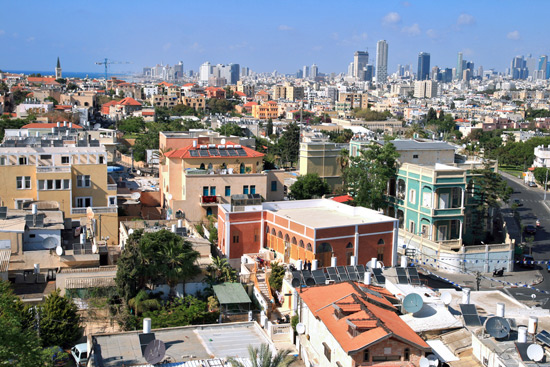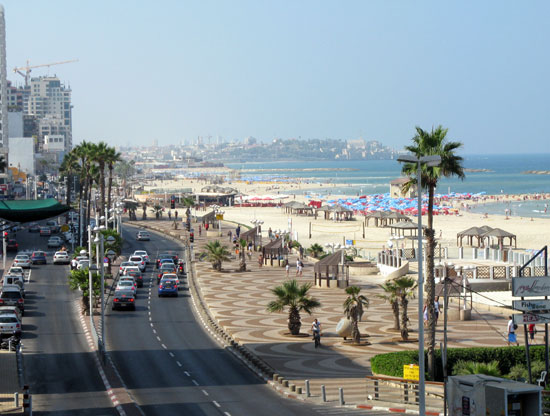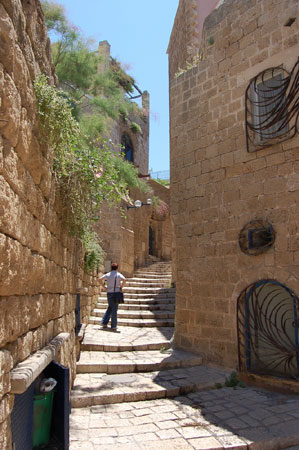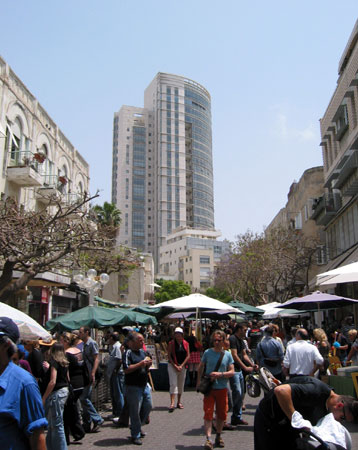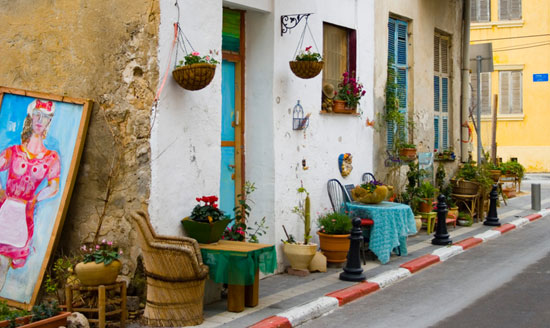Combining the style and sophistication of Europe with the joie de vivre of the Mediterranean, Tel Aviv dominates Israeli commerce, communication, and culture. Home to Israel’s stock exchange, virtually all of Israel’s banks and insurance companies locate their headquarters in Tel Aviv, and most of Israel’s newspapers, periodicals, and books are published here.
Ancient Provincial Capital
Modern-day Tel Aviv was formed in 1950 by the incorporation of the ancient port of Jaffa (Yafo) with its former suburb, Tel Aviv. Jaffa, an old Canaanite city that served as a provincial capital in ancient Egypt, was variously ruled by the Assyrians, Persians, Greeks, Syrians, Romans, and British. Tel Aviv was founded in 1909 when the Jewish quarter of Jaffa became too crowded. Laid out with straight, wide streets, parks, and modern facilities, Tel Aviv, meaning "hill of spring," was named in reference to the Hebrew title of Theodor Herzl's 1902 novel, Altneuland. The city grew sharply after the establishment of the British Mandate over Palestine, and by 1936, with a population of 130,000, it was the largest city in the land. After the first Arab-Israeli War in 1948, most of the Arab population fled. The two cities were incorporated as one in 1950, with the official name of Tel Aviv-Yafo.
A Bustling, Modern Metropolis
Today, Tel Aviv’s population numbers just over 400,000, and the metropolitan area is home to some 3.3 million people, nearly half of the entire Israeli population. This long and narrow modern city fronts the Mediterranean coastline for about 10 kilometers (6 mi), built over three sandstone hills that run parallel to the coast. The central business district occupies the older part of the city, while the main manufacturing districts extend to the south and east. Most government offices lie northeast of the business center. The hot summers drive residents to Tel Aviv’s many beaches, while winters tend to be cold and wet.
Tourist attractions include the Diaspora Museum, Eretz Israel Museum, Tel Aviv Museum of Art Ben-Gurion House, Rabin Square, Israeli Opera, and the Habimah National Theater. For shopping try the Nachalat Binyamin pedestrian mall, the Carmel Market, the Dizengoff Center, Gar Ha’Ir, and the shops on Sheinkin Street. Major industries include textiles and clothing, metalwork, vehicles and transport equipment, diamond polishing, furniture and wood products, printing and publishing, and electronic instruments. Tel Aviv is also moving quickly into the high-tech field.
Celebrating the Present
Tel Aviv boasts some of the most expensive housing in Israel and imposes a relatively high cost of living. Some call Tel Aviv soulless and lacking in finesse. Tel Aviv has also been subject to terrorist bombings, which rise and fall in frequency depending on the political situation. Check conditions before traveling. A highly political city, Tel Aviv is home to most embassies.
If Jerusalem celebrates its past, Tel Aviv celebrates the present, with culture, haute couture, and an active nightlife. Most establishments stay open on Friday nights. As vibrant as it is boisterous, Tel Aviv is proud to call itself the world’s first modern Jewish city.
Article written for World Trade Press by Emily Keeler Alhadeff.
Copyright © 1993-2025 World Trade Press. All rights reserved.



